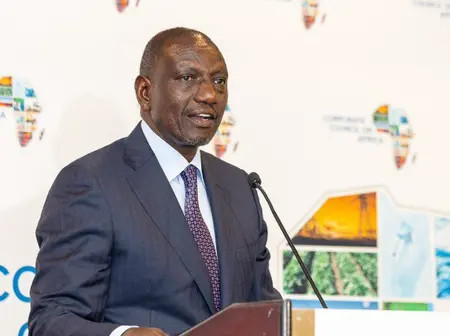Kenya must end the export of raw agricultural produce and invest aggressively in value addition and agro-processing, President William Ruto has said.
Speaking during the official opening of the 2025 Nairobi International Trade Fair at Nairobi’s Jamhuri Park Grounds on Wednesday, the President said agricultural manufacturing is the next frontier in the transformation of the country’s largest sector.
Only then, he pointed out, would farmers earn more substantial incomes from their produce, boost the creation of more jobs and trigger higher economic growth.
“For decades, we have exported our tea, our coffee, our livestock, our minerals, our cotton, our hides and skins, and even our fish in raw form only to import them back at a premium as finished products,” Ruto noted.
This model, the President explained, has denied farmers, workers, and entrepreneurs the full value of their hard work and ingenuity, saying the era must end.
Through special economic zones, County Aggregation and Industrial Parks (CAIPs) and common user facilities, he said, the government is determined to add value to every product, to create jobs for the people, to raise incomes for farmers, and to ensure that more wealth remains in Kenya.
“Value addition is not just an economic strategy; it is the key to prosperity for every stakeholder across the value chains,” he said.
Consequently, the government is working with the private sector to establish common user facilities in Kericho, Nairobi, and Mombasa to increase value-added exports of tea from the current 5 per cent to at least 50 per cent in the medium term.
Additionally, he said the National Government and counties are building CAIPs in all 47 counties.
“These industrial parks are designed to serve as hubs where farmers take their produce, access cold storage, warehousing, and modern processing facilities, and connect directly to both local and export markets,” he said.
By so doing, he explained, post-harvest losses will be eliminated, exploitative middlemen cut out, logistics costs reduced, and farmer earnings increased.
“Value addition alone, however, is not enough. Our farmers and producers must also access larger and more lucrative markets,” he noted.
With this in mind, Ruto pointed out that Kenya has signed various agreements with trading blocs and countries, including the African Continental Free Trade Area (1.4 billion market with a GDP of 1.4 trillion), the European Union (450 million people), China (1.4 billion) and United Arab Emirates, to provide bigger and more lucrative markets to the private sector and farmers.
The President said the country’s transformation is unfolding across every sector of national life, including affordable housing, tea, maize, coffee, dairy, health and leather, saying cartels who had been undermining the sectors have been dealt with.
At the same time, Ruto said the government is reforming, supporting and revitalising agriculture and trade.
He pointed out that the two sectors are the twin turbo-engines of Kenya’s prosperity, saying the government will ensure that farmers’ hard work translates into real incomes and jobs.
“Over the past three years, we have registered 7.1 million farmers to deliver targeted support, reduced the cost of critical inputs, and invested in value addition,” he said.
He expressed satisfaction with these measures, saying the bold reforms are cutting post-harvest losses, raising productivity, and linking farmers directly to competitive markets.
“This is the essence of the Bottom-Up Economic Transformation Agenda: Growth that is inclusive, sustainable, and transformative,” Ruto said.
The President also explained that the government will provide 12.5 million more bags of fertiliser across all the nation’s 1,450 wards in the 2026 seasons in addition to the 4.5 million bags already procured for the short rains’ season.
“These interventions are paying off. Maize output rose to a record 67 million bags in 2024. This year, we project an even greater harvest of 70 million bags. Maize imports have dropped by nearly 70 per cent from 9.9 million bags in 2022 to 3.3 million in 2024,” he said.
On affordable credit, he said it was commendable that the Kenya Development Corporation has secured a KSh3.7 billion concessionary loan for KTDA farmers.
He said the funds will be used to modernise equipment in smallholder factories, reduce production costs, and diversify into Orthodox teas to address the global glut in Black Crush Tear Curl.
Agriculture Cabinet Secretary Mutahi Kagwe, Nairobi Governor Johnson Sakaja and Agricultural Society of Kenya National Chairperson Edith Onzere also spoke at the event.

Leave a Reply